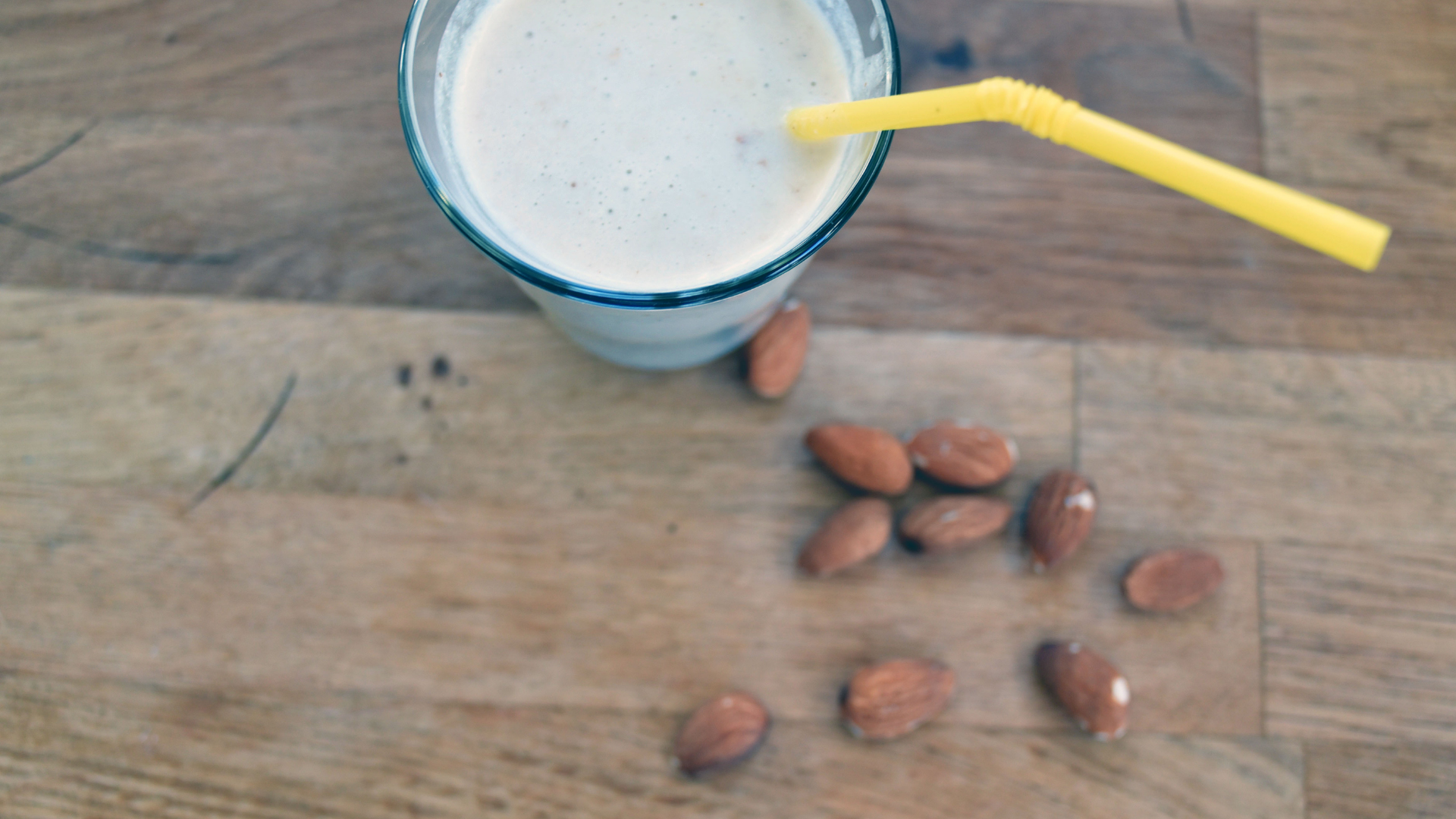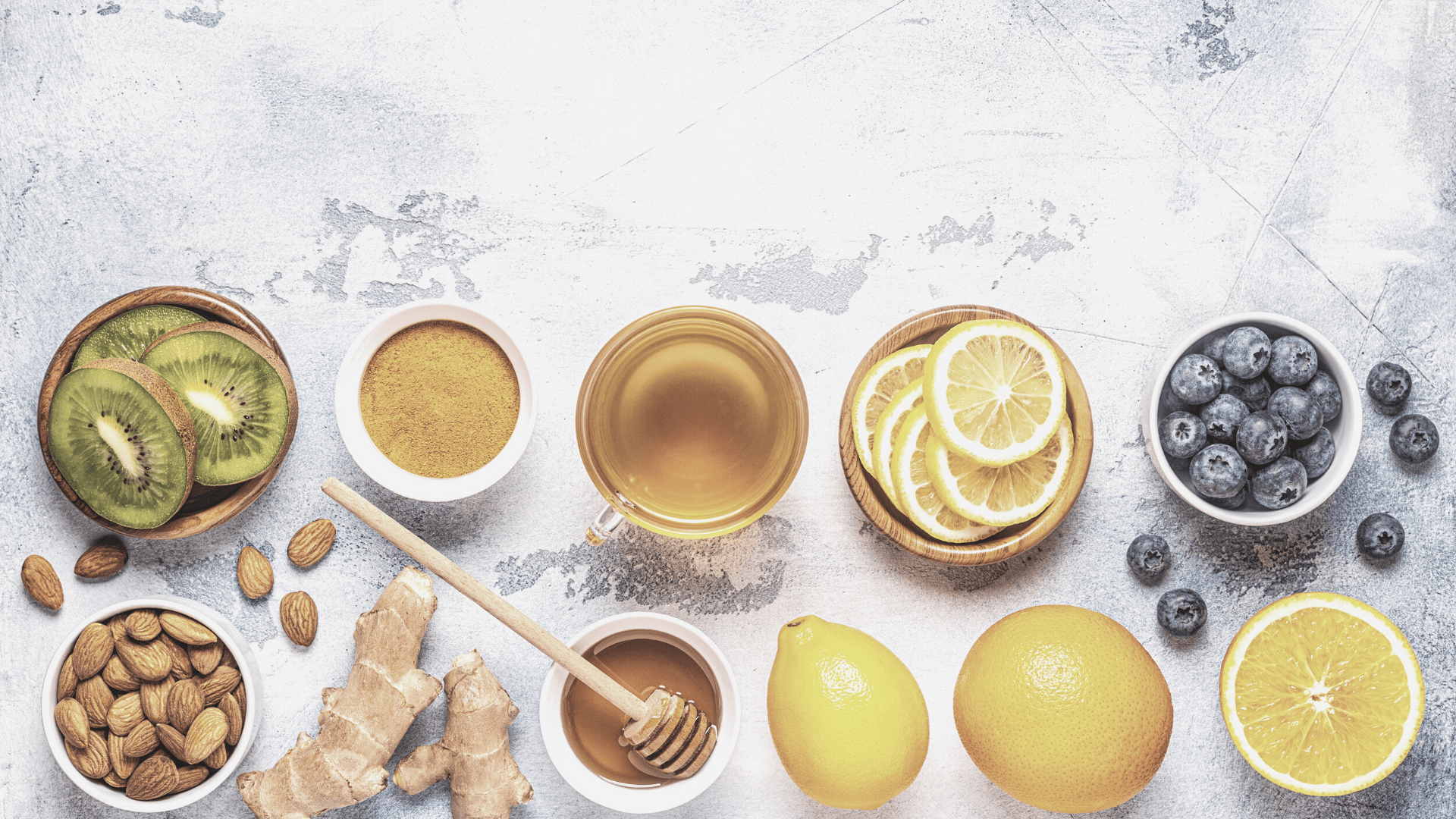I love nuts; always have and always will. But I’m always being asked, “Do nuts cause bloating? Can I eat nuts?”
So let’s unpack the topic of ‘do nuts cause bloating’ today.
Spoiler alert: At the bottom of this article, I’m also sharing my fave way sweet and spicy no-bake holiday (or anytime of the year really!) nuts.
Do Nuts Cause Bloating?
Click HERE to save this post on ‘do nuts cause bloating’ for later.
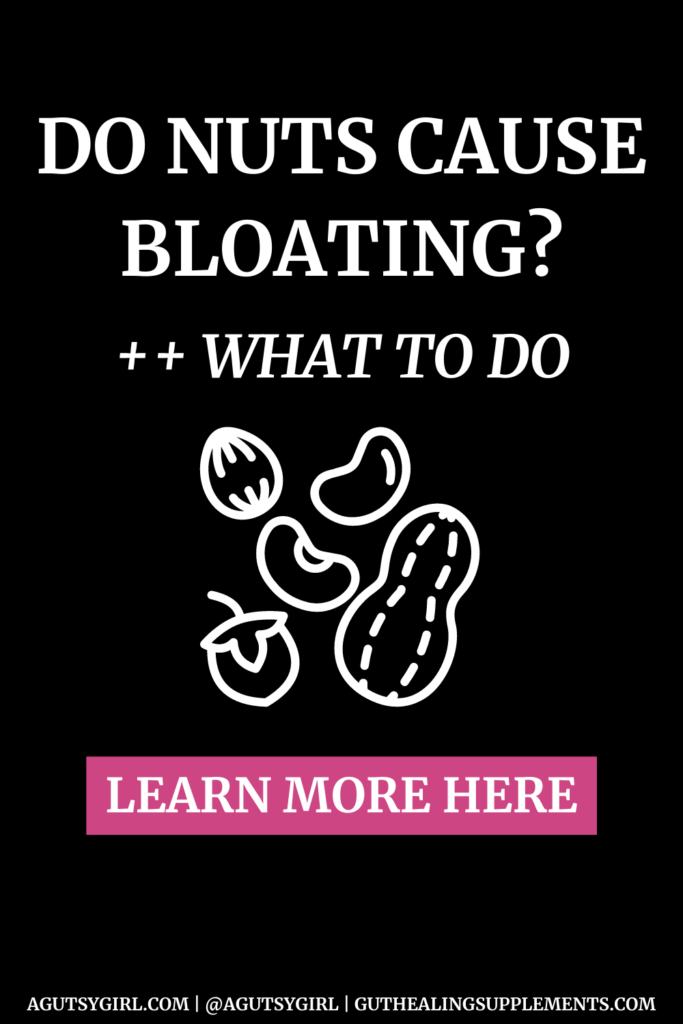
The short answer here is that yes, yes nuts can cause bloating even though they provide many health benefits.
However, I want to break it down more for you so that you don’t have to be afraid of consuming nuts.
What Exactly are Nuts?
Nuts are actually all three of the following:
- nut seeds
- legumes
- fruits
It just depends on which actual nuts we’re talking about.
Here are some of the most common nuts and seeds we eat:
- walnuts
- cashews
- almonds
- sunflower seeds
- pine nuts
- peanuts
- pistachios
- hazelnuts
- Brazil nuts
- pecans
So let’s break down these 10 a little further.

1
Walnuts
Emerging research has found that eating walnuts may alter the gut microbiome in ways that positively support heart health, gastrointestinal diseases and inflammation. (source)
Walnuts are loaded with omega 3 fatty acids, manganese, and copper.
They contain about 163 calories per 1/4 cup, are low in carbohydrates and sugar and provide nearly 4g/protein and 2g/fiber.
Walnuts are a great anti-inflammatory and have been proven to help improve blood pressure.
And, they are naturally gluten free. However, with walnuts keep in mind that many times when they are not in their “raw” state, they can contain gluten (with candy-like coats, seasonings, etc.) Make sure to eat them raw, roast them yourself or check the packaging!
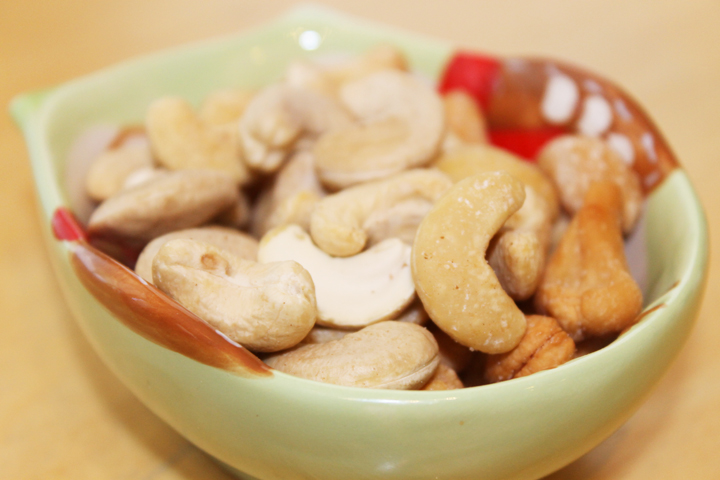
2
Cashews
While cashews are a nutritious snack rich in copper, magnesium, and phosphorus, as well as protein and beneficial fats, overconsumption and allergy can cause rare side effects such as bloating, constipation, weight gain, and joint swelling. (source)
On the other end, though, cashews are rich in unsaturated fat and boast these other benefits for a healthy snack:
- low in sugar
- source of fiber
- contain a significant amount of copper, a mineral essential for energy production, healthy brain development, and a strong immune system
- a great source of magnesium and manganese, nutrients important for bone health
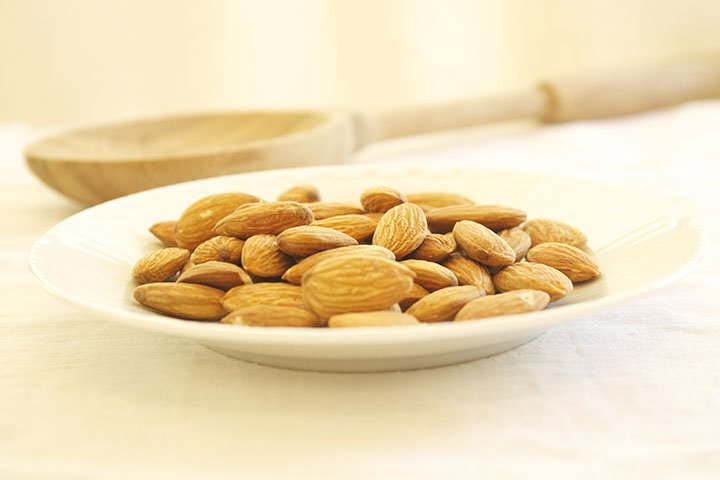
3
Almonds
Whether its almonds or almond butter, people love this tree nut which is native to the Mediterranean region.
One serving of almonds equals one ounce, about 23 almonds or ¼ cup. It is a calorie-dense food but also nutrient-dense with the majority of its fat being monounsaturated.
Almonds are a rich source of:
- fiber
- protein
- healthy fats
- vitamin E
- magnesium
- phosphorus
- potassium
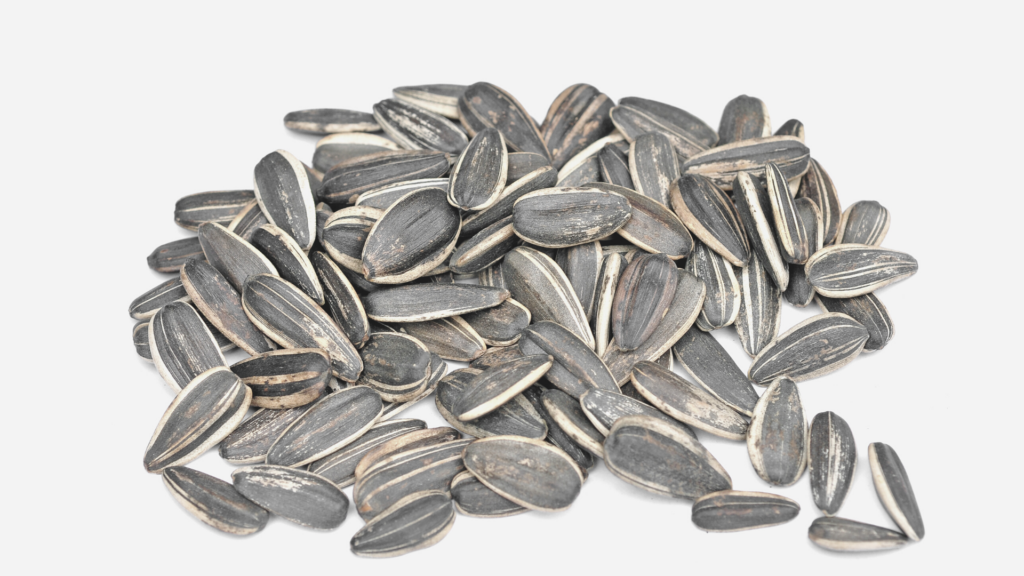
4
Sunflower Seeds
A sunflower seed is harvested from the sunflower plant.
They contain nutrients that can support your immune system and boost your energy levels.
One of the main benefits of sunflower seeds are its indications on the immune system because they include both zinc and selenium. Zinc plays a vital role in the immune system, helping the body maintain and develop immune cells. Selenium also plays a role in reducing inflammation, fighting infection, and boosting immunity.
According to the USDA, ¼ cup of dry roasted sunflower seeds without salt contains:
- Calories: 207
- Protein: 5.8 grams
- Fat: 19 grams
- Carbohydrates: 7 grams
- Fiber: 3.9 grams
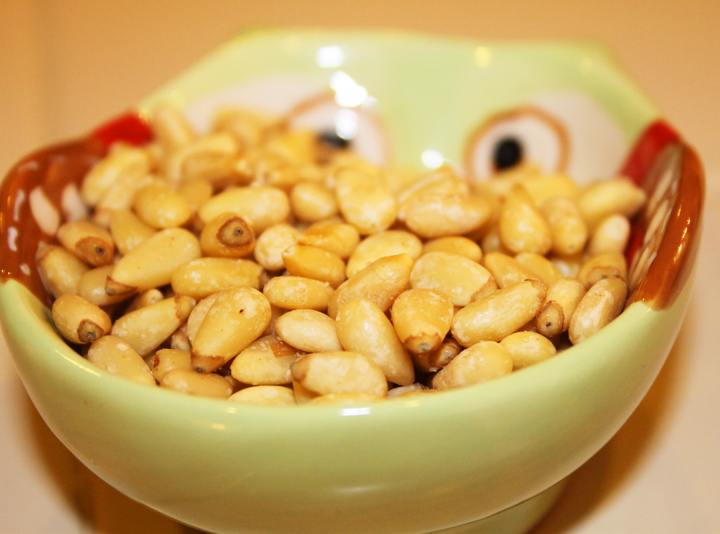
5
Pine Nuts
While Pine Nuts might not be as common to eat by the handful, in their raw state, they are very common in foods like Pesto.
One thing I love about Pine nuts (besides their excellent flavor) that they are an excellent source of the B-complex group of vitamins such as thiamin, riboflavin, niacin, pantothenic acid, vitamin B-6 (pyridoxine), and folates.
These vitamins work as co-factors for enzymes in cellular substrate metabolism inside the human body.
The B-complex group helps fight fatigue, which is common in the Gutsy community.
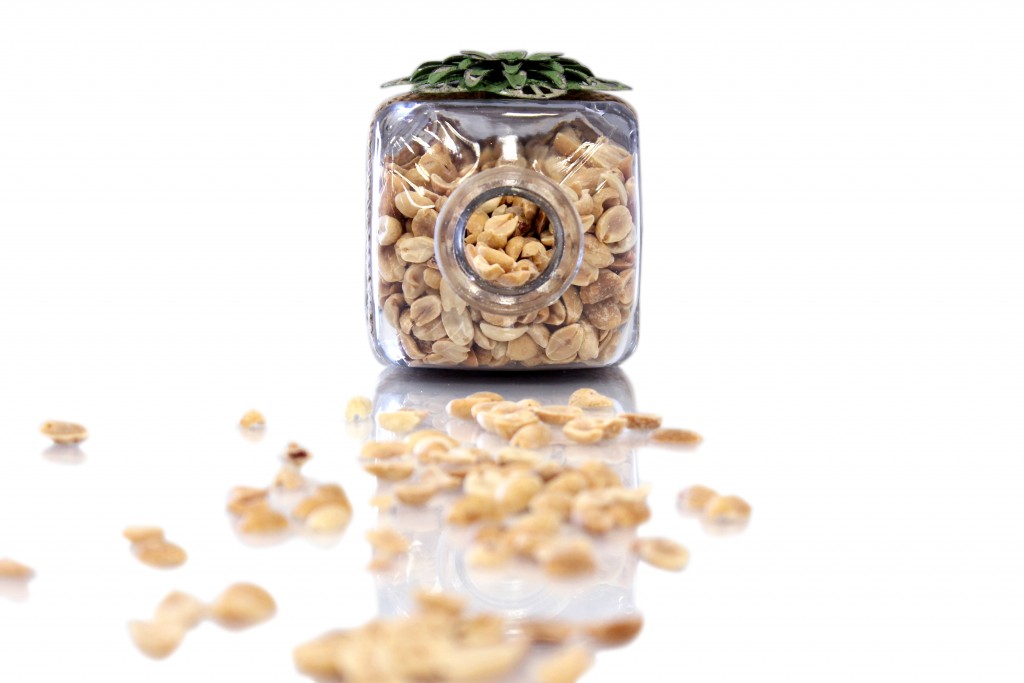
6
Peanuts
Though many in the gut health community demonize peanuts, I remain strong in my convictions that they aren’t the devil they are made out to be.
Peanuts are oftentimes the culprit for severe allergies and if you’re experiencing one, seek medical attention immediately.
But if not, then hear me out.
According to the National Peanut Board, here are some things peanuts boast:
- more protein than any nut (7g per serving)
- contain more than 30 essential vitamins and minerals
- a good source of fiber and good fats
- higher source of niacin, which is an important B vitamin that helps to convert food to energy, aids with the digestive and nervous system and helps the skin
If you want the full truth, in the early days of my healing journey, peanuts were one thing that saved my craving for sugar. They were included on the GAPS diet, and so I began playing with peanuts and other GAPS-friendly ingredients to create my own peanut butter line (which also expanded to other nut butters).
It was called A Loving Spoon, and once I said good-bye to A Loving Spoon, I sold my recipes (which you can now take advantage of HERE).
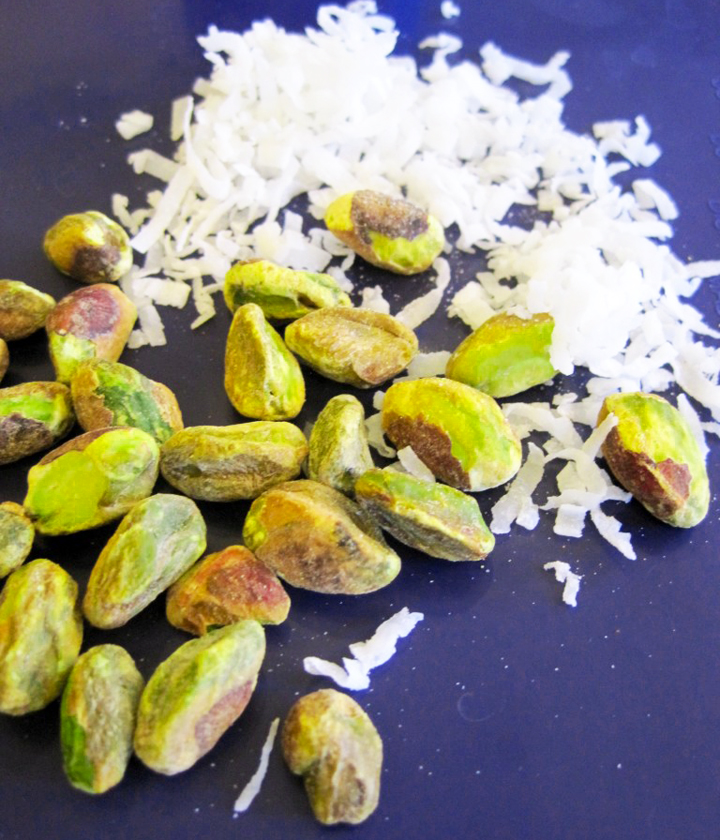
7
Pistachios
According to Medical News Today,
Pistachios are an excellent source of protein, antioxidants, and fiber. Possible benefits include boosting heart health, managing blood sugar, and reducing colon cancer risk.
This is due to:
- Rich in nutrients: A serving of pistachios provides about 37% of the recommended daily vitamin B6 intake or 1.3mg for adults.
- Packed with antioxidants: gama-tocopherols, phytochemicals, and polyphenols
- Are a prebiotic: prebiotics may also feed the good bacteria in the gut. Feeding the good bacteria helps them multiply and “crowd out” harmful bacteria.
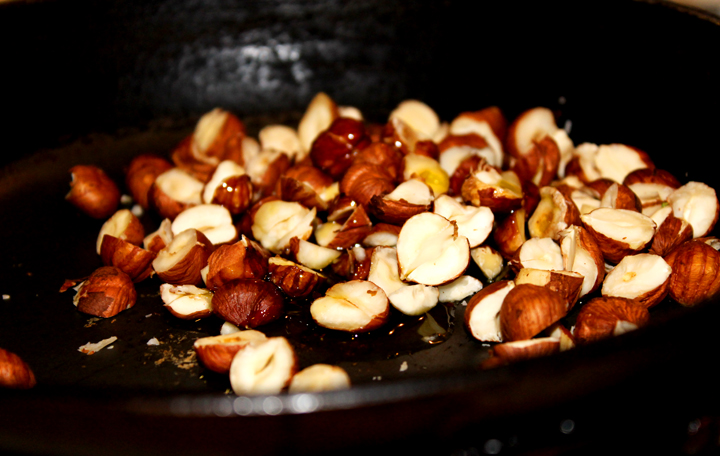
8
Hazelnuts
Hazelnuts, also known as Filberts, might be most commonly known for their feature in Nutella. However, you can skip the Nutella and artificial sweeteners (which, by the way, is also a gas-causing food), and just opt for the hazelnut in its whole state.
Hazelnuts are filled with nutrients, namely:
- Vitamin E
- Thiamin
- Magnesium
- Copper
- Manganese
- Vitamin B6
- Folate
- Phosphorus
- Potassium
- Zinc
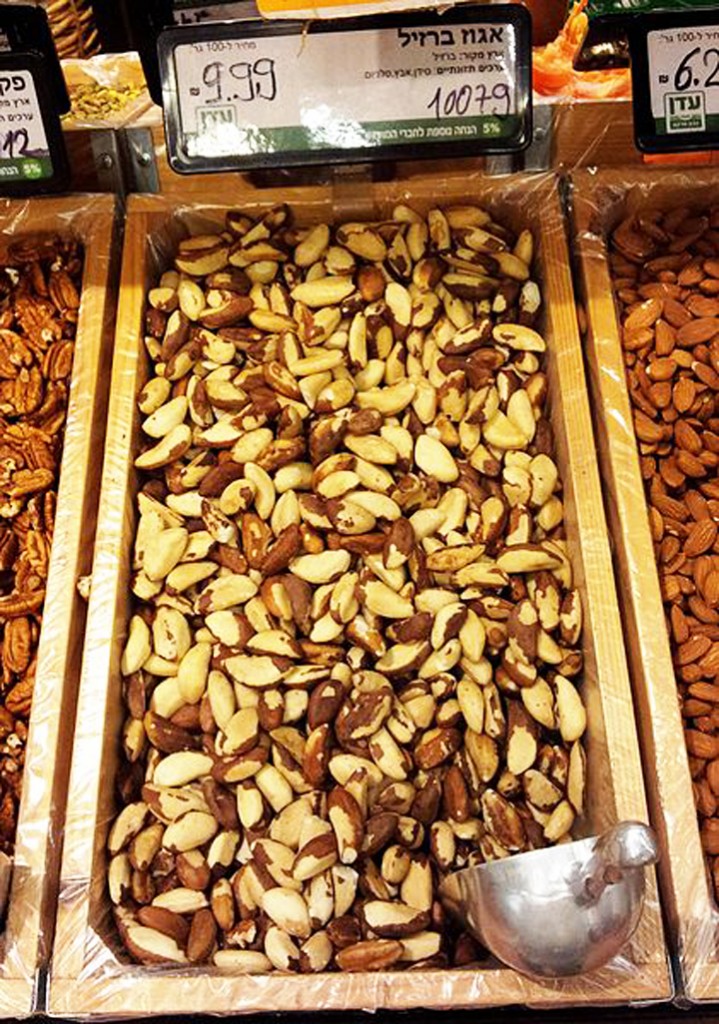
9
Brazil Nuts
- produces active Thyroid hormone
- high levels of selenium
- great source of Vitamin-E and the B-complex group ((thiamin, riboflavin, niacin, pantothenic acid, vitamin B-6 (pyridoxine) and folates))
- good levels of minerals such as copper, magnesium, manganese, potassium, calcium, iron, phosphorus, and zinc
- reduced acne
My favorite part of this nut is the high amount of magnesium (125% DV per serving).

10
Pecans
And last, but certainly not least on this list – pecans.
Pecans are a monounsaturated fat, and I’m constantly adding pecan halves to any homemade trail mix that sits on our counter.
Pecans provide phytonutrients, plant-based compounds that have powerful antioxidant benefits. They’re also a good source of the mineral zinc, crucial for immune-cell development and function.
How to Avoid Digestive Problems Caused by Nuts
Even with all the benefits nuts and seeds provide, you know that they can also lend themselves to digestive issues.
So let me share 8 ways for helping you avoid the stomach pain caused by nuts.
Click HERE to save these 8 ways for later.
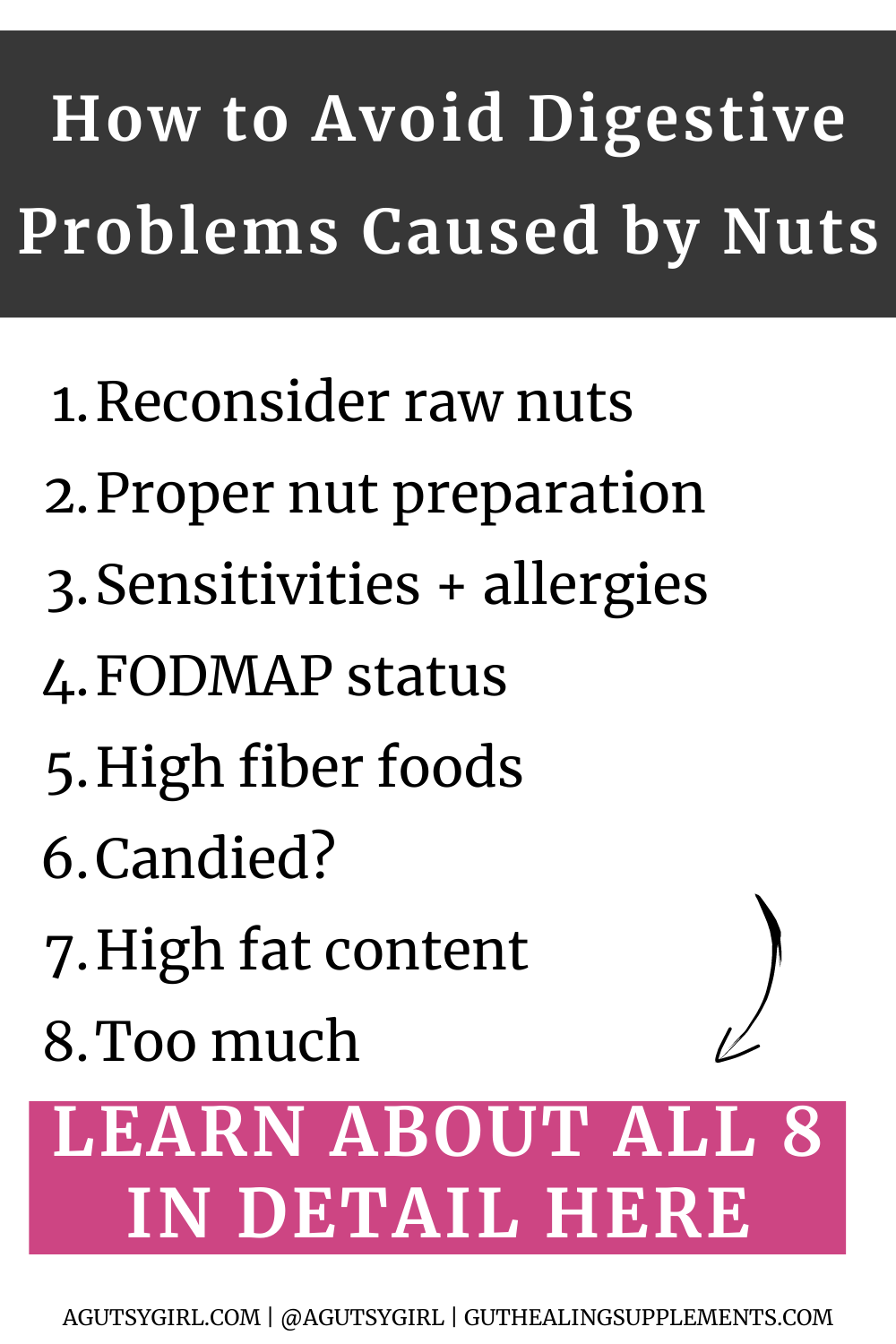
1. Raw Nuts
While I choose to eat nuts in their raw state typically, these can be harder on the digestive system.
This is due to the fact that nuts contain phytic acid. Humans lack the enzyme (phytase) to properly break down phytic acid. And the inability to break this down can cause gas and bloating. One way to break this down is through….
2. Proper nut preparation
If you are having problems with raw nuts, it’s a good idea to soak, sprout or ferment them so that these compounds break down or are leached out, creating less digestive discomfort.
3. Sensitivity and/or allergies
It’s far more common to have a peanut than tree nut allergy, but even still, nut allergies are common. You likely already know if you have an allergy as any nut consumption of specific peanuts or tree nuts would be sever. However, you might also have a food intolerance or sensitivity to them.
You can easily track these reactions by keeping a food journal.
4. FODMAP status
If you have SIBO, then certain nuts can be giving unwanted side effects due to their FODMAP content. From my list above, here are the high-FODMAP ones:
- cashews (at 10 nuts)
- almonds (at 20 nuts)
- pistachios (at 15 nuts)
- hazelnuts (moderate at 20 nuts)
You can easily test all of these with the FoodMarble AIRE device.

5. High-fiber foods
And if you have small intestine bacterial overgrowth and/or Irritable Bowel Syndrome, foods which contain a lot of fiber might also exacerbate symptoms.
Some of the nuts with the highest content of fiber include: almonds, pine nuts, pistachios, hazelnuts, and peanuts.
While the goal for overall optimal gut health is to consume foods with high fiber content, it’s not always ideal for Gutsy women at all times.
And remember, there are different types of fibers: Soluble and Insoluble Fiber.
One may work better for you than the other.
6. Candied?
Sometimes the reason your GI tract has a hard time with peanuts and other nuts is simply due to the processing. If your nut contains food labels, then read them carefully.
You’ll want to look out for added: sugar alcohols, extra ingredients, and even natural sugars that you might not tolerate well.
Remember: Ingredients vs Ingredient(s). Maybe it’s not even the nut itself, but something else?
7. High Fat Content
There are some digestive health conditions (namely, those without a gallbladder and/or functional dyspepsia) that have a hard time with breaking down fat.
If this is you, then nuts, due to the fact that they contain a lot of fat, can be the cause for your abdominal pain. While nuts are filled with healthy fats that doesn’t mean you are breaking those fats down.
8. Too much
Finally, your upset stomach from eating nuts might simply be that your portion sizes are too large. Since nuts are fiber-rich foods that also contain a higher fat content and phytates, it can present the perfect storm if you’re eating too many in one sitting.
Digestive Enzymes
One way to address many of the points above is by taking a high-quality digestive enzyme so that you can get help in breaking nuts down.
The goal with nuts (and all foods) is to appropriate break them down in order for the digestive tract to absorb the nutrients.
Therefore, if you’re having a hard time breaking down peanuts and nuts, consider a digestive enzyme to help with the digestive process.
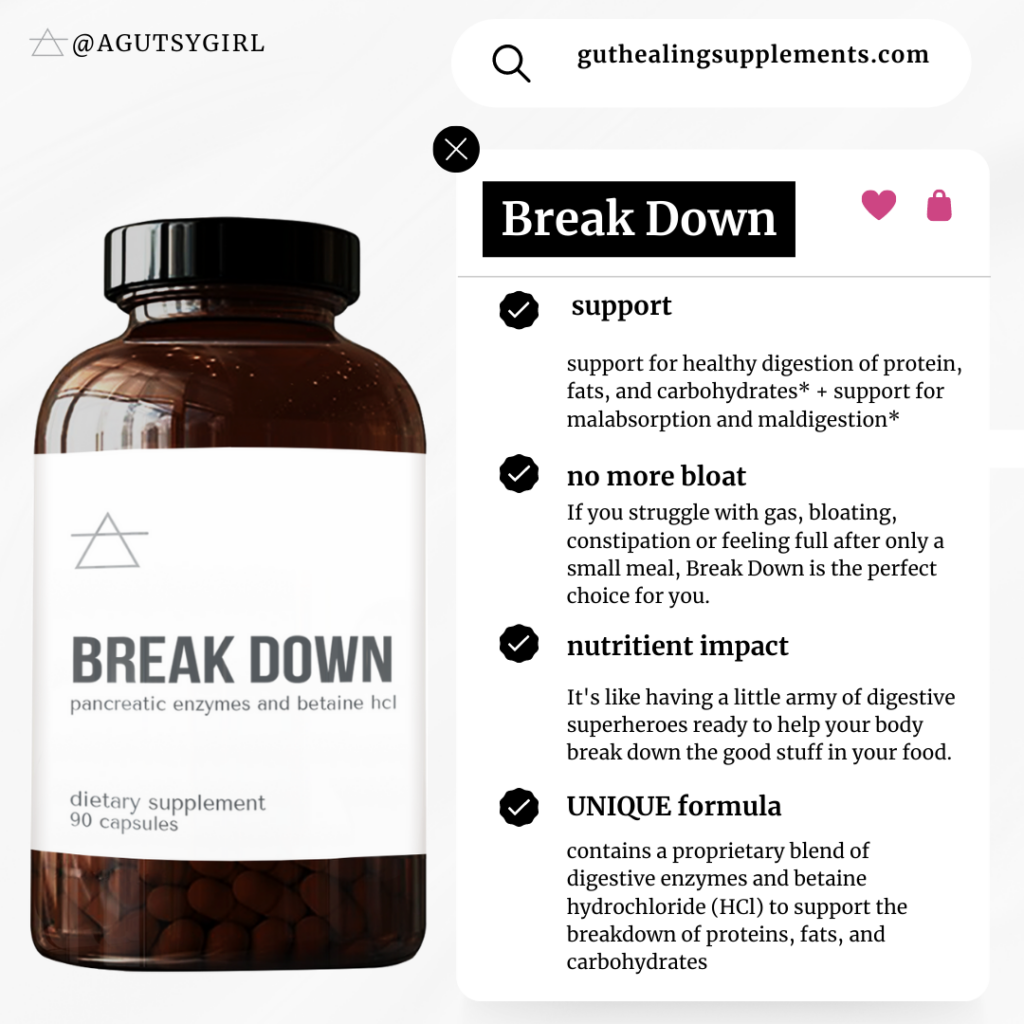
Get help breaking down your food!
Sweet and Spicy No-Bake Holiday Nuts
Click HERE to save this recipe for later.
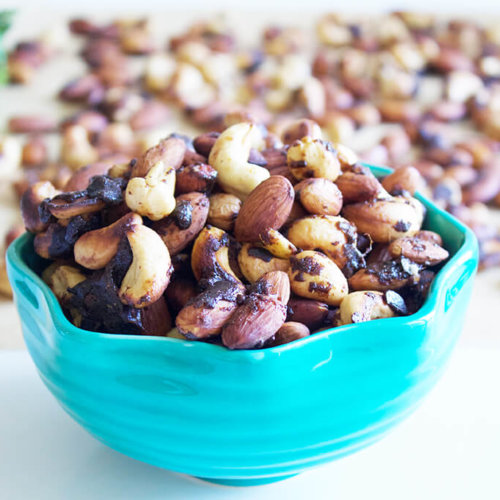
Sweet and Spicy No-Bake Holiday Nuts
Ingredients
- 2 Tbsp coconut oil
- 1 cup raw cashews unsalted
- 1 cup raw almonds unsalted
- 2 Tbsp coconut sugar
- 1 1/4 tsp ginger powder
- 1 1/4 tsp black pepper ground
- 1/2 tsp cayenne pepper
- 1 tsp sea salt
Instructions
- Heat the coconut oil in a large wok over medium-high heat.
- Add the cashews and almonds, and continue stirring until they are slightly golden in color. Reduce heat to medium-low, and add the coconut sugar.
- Continue stirring until the coconut sugar is melted, for 30 seconds to 1 minute.
- Stir in the ginger, pepper, cayenne, and salt, making sure to stir frequently to avoid burning.
- Cook for another 30 seconds to 1 minute.
- Remove from heat and place on parchment paper to cool.
- Serve immediately, or keep in a sealed container in the refrigerator for up to a week.
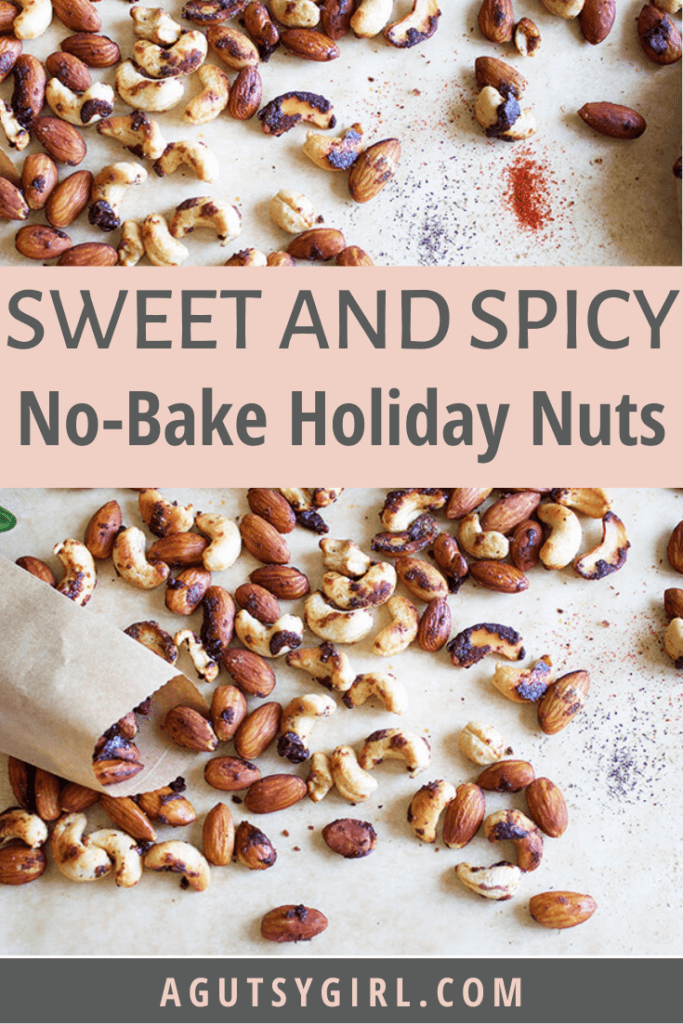
If you liked this post on ‘do nuts cause bloating’, you might also enjoy:
- Grain Free Baking Blanched vs Unblanched Nuts
- Roasted Brussels Sprouts, Grapes and Walnuts
- Gut Cleanse {and 22 Gut Healthy Foods}
Xox,
SKH
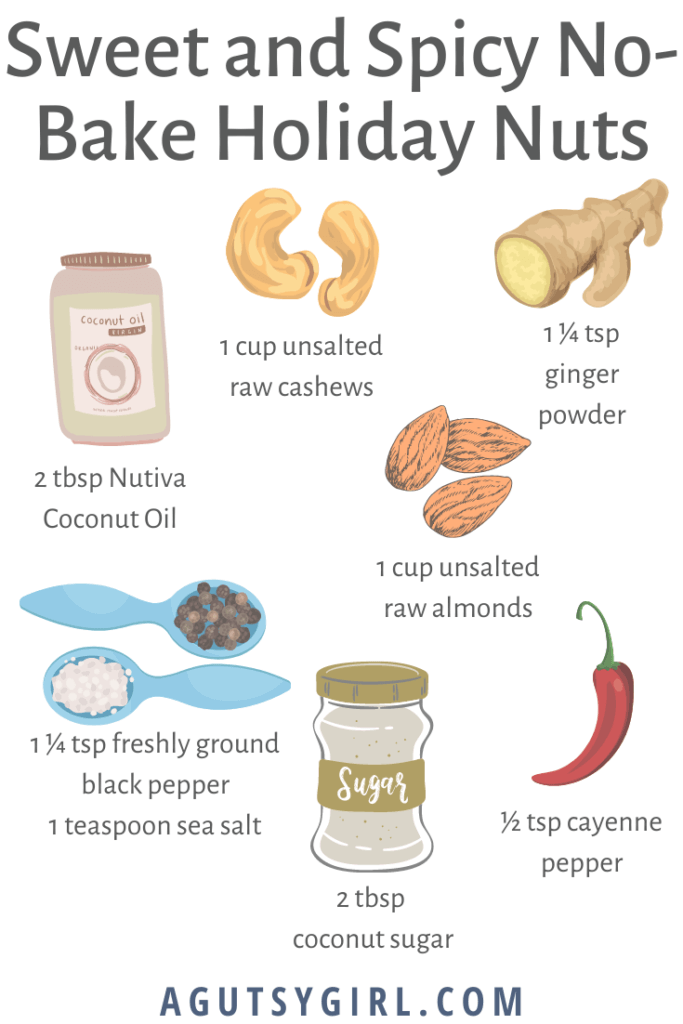
🤰 bloating be gone! weight loss through optimal gut health for women
💃ʜᴇᴀʟ ʏᴏᴜʀ ɢᴜᴛ. ʜᴇᴀʟ ʏᴏᴜʀ ʟɪfe.
🫶🏻 founder gutbyome.com


![Food Tracking [Health and Wellness Focused]](https://agutsygirl.com/wp-content/uploads/2020/11/a-gutsy-girl-magnifying-glass-featured-agutsygirl.com_.png)
